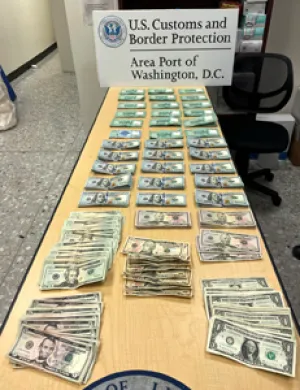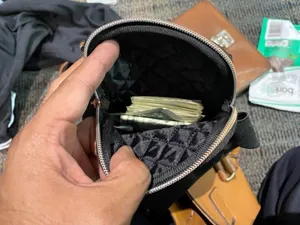STERLING, Va. – With the cost of fuel and consumer goods at historic highs, holding onto one’s money is imperative. For international travelers, that’s as easy as truthfully reporting all of the currency they are traveling with during an inspection with U.S. Customs and Border Protection officers.
Three groups of travelers recently learned that invaluable lesson after CBP officers seized a combined $95,397 in unreported currency at Washington Dulles International Airport.
Two groups of travelers were attempting to board departing international flights when CBP officers encountered them. A Lebanon-bound couple surrendered $29,052 to CBP officers on July 21, and a Nepal-bound family surrendered $32,001 to CBP officers on July 26. On July 31, a South Korean family surrendered $34,344 to CBP officers after arriving on a flight from South Korea.
In each case, CBP officers discovered more currency during baggage examinations than what the travelers reported to CBP officers. CBP officers seized their currency and released all travelers to continue their trips.
There is no limit to how much currency or other monetary instruments travelers may bring to or take out of the United States. However, federal law [31 USC 5316] requires travelers to report all currency of $10,000 or greater to a CBP officer and complete U.S. Treasury Department Report of International Transportation of Currency or Monetary Instruments [FINCEN 105]. Read more about currency reporting requirements.
The consequences for violating US currency reporting laws are severe – from missing a flight and interrupting vacation plans, to seeing all their currency seized by a Customs and Border Protection officer, and to even facing potential criminal prosecution for bulk currency smuggling.
CBP is not releasing any of the travelers’ names because none were criminally charged.
“For whatever reason, travelers continue to gamble that Customs and Border Protection officers won’t find their unreported and concealed currency, but they quickly learn that that’s a bad bet,” said Daniel Escobedo, CBP’s Area Port Director for the Area Port of Washington, D.C. “These seizures should be a reminder to all travelers to the importance of being truthful and complying with our nation’s laws, including federal currency reporting requirements.”
Travelers can get an early start on reporting their currency by completing the fillable FINCEN 105 form prior to a CBP arrivals or departure inspection.
CBP seized an average of about $342,000 in unreported or illicit currency every day last year along our nation’s borders.
CBP encourages all travelers to learn the rules governing what they can and cannot bring to the United States, plus the steps during CBP's international arrivals process by viewing CBP's Know Before You Go webpage. Just a little research can save travelers time during their arrivals inspections and get them to their destination sooner.
CBP's border security mission is led at ports of entry by CBP officers from the Office of Field Operations. CBP officers screen international travelers and cargo and search for illicit narcotics, unreported currency, weapons, counterfeit consumer goods, prohibited agriculture, and other illicit products that could potentially harm the American public, U.S. businesses, and our nation’s safety and economic vitality. Learn what CBP accomplished during "A Typical Day" in 2021.
Please visit CBP Ports of Entry to learn more about how CBP’s Office of Field Operations secures our nation’s borders.



